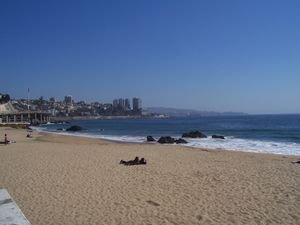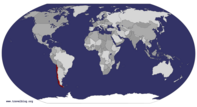Advertisement
Published: September 6th 2007

 Beach
Beach
The beachI made it, I’m surviving, and I love it. The only problem to report is I’m surrounded by people speaking Spanish, and I don’t. More on that in a second.
I left for Chile on Tuesday morning, August 28th. The journey began with a trip to South Beach once my plane landed in Miami. My friend Matt and I spent the entirety of my layover on the sands of South Beach, swimming in the Atlantic. I was going to see two oceans in one day. Miami was the perfect transition from the Midwest to Latin America; I even had to speak Spanish (poorly) to a parking attendant when we lost our parking slip.
I returned to the Miami airport at 5 pm to find a group of nervous college students gathering by the ticket counter. I knew right away they were my future “Chile: Culture, Development and Social Justice” classmates. The class consists of 23 females and 3 males. One of the other guys, Jonathon Webster, is a junior at Northwestern as well. We had a Spanish class together freshmen year, so we’re at about the same Spanish level - although he works with a lot of Mexicans and

 Flower clock
Flower clock
The Flower clock in Vina del Marunderstands the language much better. The other guy’s name is Israel Garcia. He’s Mexican, speaks fluent Spanish, and attends the University of Colorado Boulder. The 23 girls all seem very nice, but I can only remember half their names.
The flight via LAN Chile took off at 10 pm. Unlike American airlines they could care less if you wear a seatbelt or stay in your seat. I moved to an empty row of three seats and sprawled out for the night. I hurriedly read the required book on Chile as we flew across the world. Much to my disappointment, and although I tried my best, I could not see the equator. We landed in Santiago, Chile at 6 in the morning (Chile is also on Eastern Standard Time).
Following a breeze through customs, I encountered a Chilean woman screaming “Kevin!” She ran over to give me a kiss on the cheek. I’ve learned this is the common Chilean greeting. Immediately following her, a Chilean man no more than five foot five, emphatically shook my hand. Then a rather tall American man greeted me. They were our Academic directors: Rossana, Danko, and Mark, respectively. They knew everything about us,

 Hotel room
Hotel room
Hotel room in Vinaat least everything in our applications. They memorized our info and our pictures; it made the nervous arrival in a strange place much easier. We soon left the airport and drove 100 miles to our new home, Valparaiso, on the Pacific coast.
So far as I can tell, the program is simply amazing. The people that run it are full of excitement and they have gone over and above to make sure we are comfortable in this strange land. We spent the first 4 days in a hotel in Vina del Mar, the city bordering Valparaiso to the North (people consider Valparaiso and Vina one city. Vina is an affluent vacation destination for tourists from Chile and abroad). The weather hasn’t warmed up yet (it’s still in the 60s) but September 21st marks the beginning of Spring. No buildings have central heat, only portable gas powered heaters. The hotel was no different from an American hotel: hot showers, television with many American channels, mini bars of soap, etc. We ate all three meals each day in the hotel dining room. The food was delicious - lots of fruits, vegetables, bread and meet.
We spent the first days in
orientation, learning about safety, health and the academic part of the program. Valparaiso/Vina is a very wealthy and very poor city at once. We learned all the safety pointers, such as not carrying important documents, carrying small amounts of money, staying aware of your surroundings, traveling in groups, etc. - a lot of the same info Evanston/Chicago police shared with us in our Northwestern orientation. One major difference: there are hundreds, if not thousands of wild dogs (all types) in the streets - almost like squirrels in the Midwest. They’re extremely used to people and don’t bother us at all. Hearing dogs bark is as common as hearing crickets at night. The city buildings have a heavy European influence and the Chileans like to paint them many bright colors (see pictures). The city rests on the side of a steep cliff, with many smaller hills or “Cerros” making up the neighborhoods.
The first thing they told us in the health seminar was not to worry about drinking the water - a HUGE relief. Our predeparture packet told us we needed to boil all drinking water for twenty minutes, as well as use bottled water for brushing our teeth. It
turns out that is a gross exaggeration - an international precaution taken by SIT (School for International Training). The water is fine to drink as long as we’re in big cities such as Valparaiso or Santiago. Valparaiso has first class medical facilities and doctors in case any of us is to get sick. It really is the first world of the third world. Many of my worries prior to leaving have turned out to be unnecessary. The city is very developed in many ways.
I’m very excited about the academic aspect of the program. Chile has an incredibly fascinating history, especially in the last few decades. The country has transitioned from a communist democracy to a military dictatorship to a socialist democracy, all since 1970.
Our program consists of six components: Academic seminars, community service work, a two-week excursion to a rural part of the country, an independent research project (ISP) during the last month, an intensive Spanish class, and our homestay.
Academic seminars are a series of lectures about the history, politics, economy and culture of Chile. Included in the series are a few lectures about conducting field research during our ISP. The lectures are held
in a local University called Santa Maria, whereas our Spanish classes are held in the “Casa SIT” in Vina del Mar.
Every Wednesday for six weeks, I will be working for a community service organization in Valparaiso. We can choose from a range of locations; everything from working with children to working with independent fishermen. We have our first day of community service work on Wednesday.
We spend six weeks in Valparaiso then embark on a two-week excursion in the rural northern or southern part of the country. We will live in a hut with an indigenous family and learn about their culture. In the month following the excursion, we must complete a twenty-page research paper on a topic of our choosing.
Spanish class begins on Tuesday and I definitely need it. I’ve forgotten a lot of my college and high school Spanish, and I still can’t understand the Chilean dialect. Chileans speak rapidly and chop off the endings of many words. I’m starting to pick it up, but I have a long way to go.
I live in a house on the side of a hill in Valparaiso with my homestay mother and father, an
older couple named Maria Ester and Ugo. The house is small but well furnished. Maria and Ugo don’t speak English at all, so communication can be rough. I can understand the big ideas and slow, short sentences. Maria is a Spanish professor at a nearby university and has vowed to make sure I am speaking fluently by the time I leave Chile. She loves teaching me the dirty Spanish slang. The couple has hosted an SIT student for the past 13 years, so they know the program very well. I have an older brother and sister who live somewhere else in Valparaiso; I’ve only met them once. My brother likes all American sports, especially the NFL. My sister is an English professor at a local university so when she’s around I’m very grateful. I also have a cousin and a nephew that live nearby. They are both around my age and learned Spanish from watching American movies and TV shows. They’ve also been very helpful.
Life is good in the house. My homestay mother cooks excellent lunches and dinners (lunch being the larger of the two meals). My parents like to eat and drink wine so we get along
well in that respect. Most of the time I have to tell my mother to stop feeding me because I am “muy satisfecho.” My stomach has adapted to the food without any problems. They like to eat lots of fruits, vegetable, and especially bread. My parents are incredibly kind people and I’ve even managed to slip in a few Spanish jokes here and there. I have my own room in the house; it’s small, has a single bed, dresser and desk, but it fits my needs well. I also have five dogs that all live outside. I know three of their names are Felipe, Martina, and Florencia. Jonathon, one of the other American guys in my class, lives a few houses down. We travel together when we go to the city.
The Chilean people have been treating me very well. My cousin and nephew took me out to a bar with their friends on Friday night. Chilean guys love to teach me all the dirty Chilean slang words. “Huevon” is a slang word either meaning “asshole” or friend or both. The nightlife is a lot of fun in Valparaiso. The city has many discoteques (clubs) and salsa bars. I’ve
attempted the salsa a few times, but I need a lot more practice.
The first thing I learned in Chile is the term “gringo,” meaning “American.” The second thing I learned is that Chilean men love American women (gringas) and Chilean women love gringos. When we go out, all the Chileans, men and woman, stare at us, like we’re celebrities. I enjoy it, but sometimes it can be rather intimidating. The Chileans are very fascinated with gringos. It’s common for people in the streets to want to touch the hair of the blonde girls in my class. Strangers treat us well, but many Chilean men like to scream or whistle at the American girls in the street.
Chile, as a country, imitates everything gringo. I suppose that’s why they’re so fascinated by us. My family likes to play the radio in the house, and the radio stations mostly play American songs from the 70s and 80s. You’d be surprised how many American products they have here.
I think was made for Chile. The things Chileans love most are eating, napping, and going out at night. I must say, though, Chileans out party Americans; they stay out until

 Dining room
Dining room
My homestay mother in the dining room6 or 7 in the morning. I’m having an incredible time here. It’s so fascinating and different from anything I’ve ever experienced. I’m excited to start understanding Spanish so I can begin to enjoy more of what this city has to offer.
I would recommend that if you ever get the chance, come to Valparaiso.
Advertisement
Tot: 0.098s; Tpl: 0.031s; cc: 5; qc: 45; dbt: 0.0536s; 1; m:domysql w:travelblog (10.17.0.13); sld: 1;
; mem: 1.1mb











Chase
non-member comment
You lucky bastard.
I'm so jealous, you have no idea. Sounds like a great time. Don't forget to being me back a Chilean girlfriend. Be safe brother.